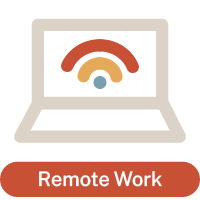Working in Human Resources roles for two decades now, I’ve definitely seen some shifts over the years in the area of hiring and retaining great talent. One of the biggest changes for me is being responsible for recruiting people who want to work remotely and assuring they will be successful in this type of atmosphere.
Here at First San Francisco Partners (FSFP), we’re a fully virtual company with employees distributed across many time zones, both in and outside the U.S. While our team members sometimes work on-site with clients, much of our time is spent working from our respective homes or from coffee shops or wherever we’re plugged in on a given workday.
And we’re not alone. With 4.7 million remote workers in the U.S., it’s clear remote work works and is becoming the new normal. Several studies point to its benefits, with remote workers being 87 percent more likely to love their job, 80 percent reporting less job stress and 85 percent of businesses confirming increased productivity.
Like any good hiring manager, I’m always hopeful that the people I help secure a new role stay on for years, love what they do and become valued by the company. I want our new hires to not just survive but thrive in their remote-work role.
I do my job from the comfort of my home office and can’t see myself ever going back to a role that required me to drive into work or sit next to a co-worker. While I thoroughly enjoy who I work with, I truly value my independence, schedule and remote-work lifestyle.
If you’re interested in working remote, like we do here at our data management consulting firm, here’s my advice on how to be successful in a virtual role — and I asked some of my FSFP teammates to weigh in on the topic of remote work, too.
Be a Strong Communicator
Working remote, where everyone is an email, direct-message, video call, text or phone call away vs. in an adjacent cubicle or office, requires you to be a stellar communicator. If communicating isn’t your strong point, it could become a pain point at a virtual company. Regular, effective communication is so important … it might be the number-one key to remote-work success!
How we communicate is baked into our individual personas, and our style’s undoubtedly been tested and revised over the years by feedback from people we interact with at work.
Working remote can test your communication skills, but even rock-star communicators will benefit from having the right technology at-hand. That’s why we use leading collaboration and communication tools, including Slack and Zoom, to keep our team connected, highly responsive and ready to communicate efficiently, directly and on-topic.
Some of us use these tools more consistently and others prefer phone and email. (There’s still a place for these “old” tools, of course!) Whatever tools we rely on, we know it’s up to us to regularly reach out to talk with our teammates and clients and not “go dark” and have people wondering what we’re up to.
 Kelle O’Neal, Founder and Chief Executive Officer
Kelle O’Neal, Founder and Chief Executive Officer
I agree that being a strong communicator is important to our remote culture. I also know that effective communication begins at the top, starting with me and our leadership team. It’s a focus area we can never put aside, just because we’re busy.
We rely on our consultants to communicate effectively with both clients and the people they collaborate with here. We’re often on the phone or talking in Slack and can’t rely on body language to help get our messages across … so our words really matter! (By the way, Slack is an indispensable tool for us, with topic- and task-specific channels, as well as channels for client project teams. Slack helps keep us connected and talking regularly!)
I strive to keep everyone connected to what we’re doing — making sure our focus areas are known and supported and regularly sharing what we’re hearing in the industry, reporting back on what we learn at conferences, any problems we’re experiencing, etc.
Two ways we do this are in periodic “Friday Forums” and all-hands video conferences, where we talk about key discoveries from client engagements, introduce new tools and partners and do deep dives into critical topics, like CCPA.
We also have quarterly team calls, which have been commonplace for a few years now. These Zoom calls, along with the emails I send out at quarter-end, go a long way in keeping our remote team connected — and they support our company’s mission, vision and values (FIRST: Focus, Integrity, Resourcefulness, Skillfulness and Teamwork), too.
(Note: You can find more of Kelle’s thoughts about our remote-work culture here.)
Be Comfortable Working Both Individually and Collaboratively
The majority of the people at FSFP work collaboratively with clients. But we all have times where we’re working individually on certain initiatives, often making decisions and setting priorities along the way that we individually establish and then must meet.
When I’m interviewing job candidates, I look for people who can speak to a skill of being self-directed and have a track record of reliability. I’m also looking for those who can talk about how they’re good collaborators. Both skills are important here, as we have to go back and forth between the two.
 Catherine Ruef, Consultant
Catherine Ruef, Consultant
Some of the work I do as a consultant is more self-directed — creating project workflows and configurations independently — but then I vet and validate this information with my teammates and also our clients.
To facilitate optimal remote-work communication, I like to have standing meetings and periodic conversations with the people I collaborate with. Meeting regularly gives us the opportunity to review work at-hand and express any questions or blockers we’re experiencing. More times than not, someone is able to offer a solution or assist in overcoming an obstacle.
Touching base regularly builds stronger bonds with both my co-workers and our clients. The remote relationships we form and nurture not only make the experience here more enjoyable for everyone, but also has a direct impact on the quality of work we collectively do.
Know When You Need Assistance … and Ask for It
One of the benefits of working together with people in an office that we don’t get in a virtual company is close proximity to everything we need. We could see when executives are walking around on our floor. We could notice when a co-worker is having a rough day and lend an ear. And we could go to lunch with someone from another team, when it’s time to talk about a cross-department initiative.
Another benefit to proximity is getting help when we’re stuck. We need to be comfortable and timely in speaking up, and in a typical work environment, help never seems to be that far away.
In a virtual office, we’re required to be more self-sufficient. We’re going it alone, much of the time, and need to buckle down and figure things out on our own. Yet … we have a virtual team around us that we can reach out to, even if we’re not just miles but states apart.
When I’m talking with someone with limited remote work experience who wants to join FSFP, I might ask how they think they’ll succeed in a remote environment and what skills they’ll rely on to be focused and get their work done. I want to know if they’ll be proactive. Will they speak up and not sit silent? Can they build relationships to help foster the recurring help and advice they’ll need? (Especially in the early months where getting up to speed on a new job is taxing for most everyone, this is critical.) I’m looking for answers to these questions to see if they’ll be a good fit for our virtual environment.
 Melanie Deardorff, Content & Social Media Specialist
Melanie Deardorff, Content & Social Media Specialist
I’ve been working with FSFP for almost four years now — time flies when you’re working remote! But I can still remember what it was like to be new to the world of data management. The industry jargon. The complex topics. And what does it mean to govern data?!
I’ve never been shy about asking questions, but I was used to being able to turn to a cubicle-mate or walk into my manager’s office to share what was on my mind. Here, I needed to not just speak up but track down what I needed to get my job done. Everyone was busy, but I was tasked with coming up with new content for FSFP’s blog and for keeping our Twitter and LinkedIn accounts fresh and real-time.
What I found, early on, is that people didn’t mind questions or that I was new to FSFP’s industry. People appreciated my fresh perspectives, because my job was to help communicate FSFP’s differentiators and expertise to the public. What better than a newbie to help keep messages clear!
Over time, I had far fewer questions. But I still came up with some, because this industry is ever-changing.
Just this week, I came upon an article about Steve Jobs and loved what it said about the importance of speaking up.
It’s often not easy to ask for help. Asking can make you feel insecure. Asking can make you feel vulnerable.
But oddly enough, that’s a good thing.
By showing you respect and trust other people, and by giving them the latitude to freely share their expertise or knowledge, you don’t just get the help you think you want. You might also get the help you really need.
Set Up Your Remote Environment for Success
We’ve all heard that, when it comes to desirable real estate, it’s all about location, location, location. I’ve come to believe that having a great remote work location is key to virtual success, too.
I support the idea of working from coffee shops and those co-working spaces that seem to be popping up everywhere. But I find I’m most successful in my home office, and one of my newer co-workers here, Les, seems to agree. Organization, time management and an ability to prioritize work tasks is critical for us at our speed of business. Having a dedicated space to work, focus and stay inspired facilitates productivity.
 Les Marsyla, Senior Consultant
Les Marsyla, Senior Consultant
The keys to my remote work success has been the ability to keep to an office-like environment and set routine.
I work from a dedicated home office and resist the temptation to use my laptop on my kitchen or coffee table. Though my office set-up is simple (just a desk, chair and some storage), this designated space helps keep me focused on work.
I also maintain regular hours. They begin a little earlier than my old (non-remote) office hours, because I’m able to ditch almost two hours of commute time in the morning!
Be Focused, Yet Flexible
When we hire data management professionals for FSFP, we typically set out to find people with notable experience in one or more of our specific focus practice areas (data governance, data privacy, reference data, et al). We look for people who have either been in client-facing roles before or worked in a data management role inside an organization.
While a job candidate’s relevant expertise will always get our attention, we also look for people who’ve been able to supplement their focus-area knowledge with additional experience. This could be a one-time stretch assignment they tell us about, a promotion they received or a revealing back story about why they moved from one department to another.
The fact they’re comfortable learning new things, being flexible and taking some risks are traits we look for here.
 Mike Carden, Director of Delivery and Operations
Mike Carden, Director of Delivery and Operations
We’ve shifted our hiring strategy from when I first joined FSFP almost three years ago. Instead of focusing on finding people with subject matter expertise in a specific domain, we look for candidates who can demonstrate they’re eager to grow their knowledge and subsequent experience beyond just one or two practice areas. These candidates tend to be more focused on how they can leverage what they know and what they can learn to accelerate client success. This aligns to our goal within Delivery of becoming a true partner with our clients and not just working with them on a project.
During the interview process, we listen to how people respond to questions we ask about what they know and also don’t know. We talk with them about how they approach engagements and client relationships. We also pay attention to questions they ask about job requirements and their interest in the client engagement work we do at FSFP.
When we hear folks talk about how they work hard to keep current in our ever-changing industry — or passionately discuss some out-of-the-box solution they delivered to creatively meet a data challenge — we get the sense they’ll be a great fit for our team and for the adaptability required to succeed.
Remote Work Works for Us
FSFP has been a virtual company since its inception in April 2007. We were ahead of the remote-work curve back then and have learned a lot over the years. We continue to optimize as much as we can.
If you’re a data management professional interested in serving amazing clients in a virtual work environment, I’d be remiss if I didn’t close with this: Look at FSFP’s Careers page to see our available opportunities … and let us know if you’re interested in joining the team!
Article contributed by Cinde Wakefield. She has more than 20 years of experience in the IT industry, where she spent most of her years hiring and managing employees in product development, quality control, project management, training and customer support departments. She has a knack for finding first-rate talent — from the recruitment phase through ongoing employee development .


